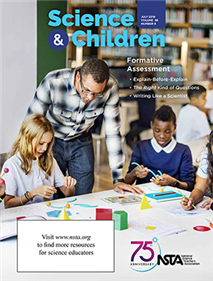Science and Children—July 2019
Journal Article
Using science notebooks to scaffold writing for first-grade students...
Journal Article
Editorial: Assessment: Take a Deeper Dive
Science and Children’s editor shares thoughts regarding the current issue....
Journal Article
Early Years: A Lesson on Living Organisms
This column discusses resources and science topics related to students in grades preK to 2. This issue presents a lesson on living organisms....
Journal Article
Early Childhood Resources Review: The Young Artist as Scientist: What Can Leonardo Teach Us?
This column evaluates elementary science resources. This issue focuses on the role of art in science....
Journal Article
The Poetry of Science: Poetry, Puppies, and Results
Building literacy in playful, meaningful ways....
Journal Article
Teaching Through Trade Books: Animals Help With Engineering
This column includes activities inspired by children’s literature. This issue focuses on engineering....
Journal Article
Engineering Encounters: Sinking and Floating 2.0
Using 3D printers to excite children in aftercare about science and engineering...
Journal Article
Science 101: What are some common misconceptions to be aware of when teaching about astronomy?
This column provides background science information for elementary teachers. This issue focuses on misconceptions with astronomy. ...
Journal Article
Teaching Teachers: Discourse Tools Amplify Students’ Ideas and Build Knowledge
This column enhances the repertoire of preservice and inservice teachers....
Journal Article
This column provides ideas and techniques to enhance your science teaching. ...
Journal Article
Guest Editorial: Formative Assessment in the Science Classroom: What It Is and What It Is Not
An opinion column about formative assessment....
Journal Article
Formative Assessment of English Language Proficiency in the Science Classroom
By Okhee Lee and Rita Januszyk
Journal Article
This article describes how teachers can use first graders' scientific models as formative assessments....
Journal Article
How to create formative assessment experiences for fifth-grade students learning about energy transfer....
Journal Article
Exploring essential properties of matter with fifth graders...
Journal Article
The <i>Right</i> Kind of Questions
A fourth-grade 5E unit on electrical circuits fosters integration of practices with content learning....
Journal Article
Formative Assessment of English Language Proficiency in the Science Classroom
In a linguistically diverse fourth-grade classroom, students carry out an investigation to answer the lesson question: How are we able to see objects? Working collaboratively in groups, students are given a lidded box with an eye hole and a flap. Stu...
By Okhee Lee and Rita Januszyk




